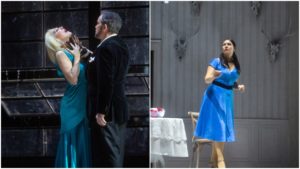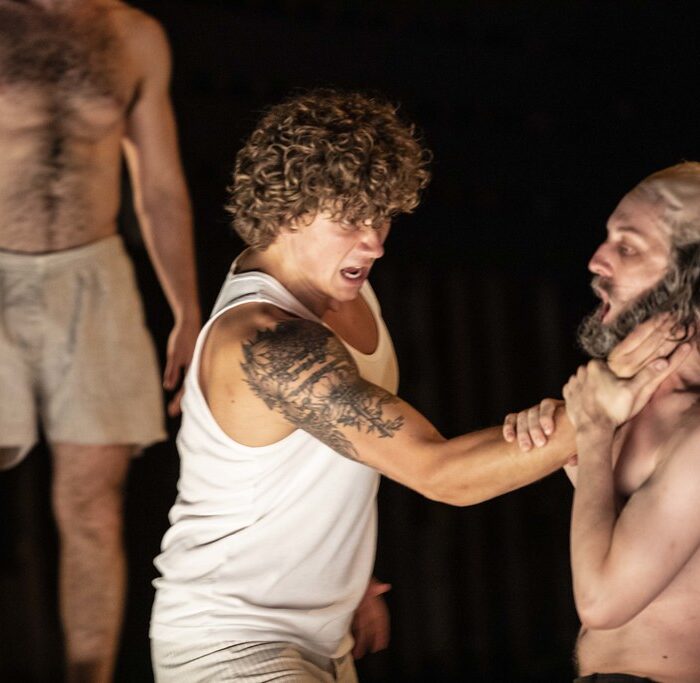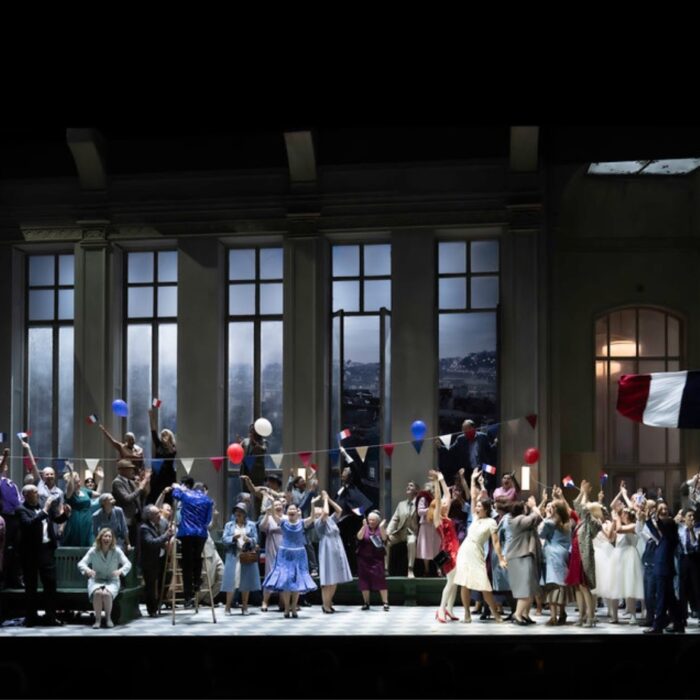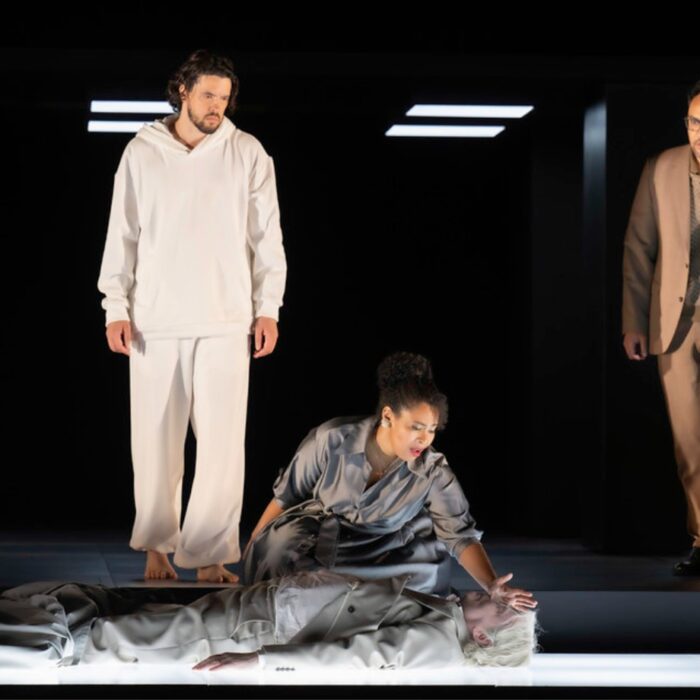
Metropolitan Opera 2018-19 Review: Iolanta & Bluebeard’s Castle
Sonya Yoncheva Disappoints While Angela Denoke & Gerald Finley Light Up The Stage
By David SalazarThis review was written by David & Francisco Salazar for the performance on Jan. 24, 2019.
With the double bill of “Iolanta” and “Bluebeard’s Castle,” director Mariusz Trelinski sought to explore how the search for vision could lead to growth but inversely lead to darker truths and self-destruction. When his production returned to the Met Opera on Thursday, Jan. 24, 2019, that story was only told compellingly in one of the two operas on the bill.
In creating his production, which is full of projections that emphasize the mythic qualities of both production, Trelinski finds visual means to connect the two operas in illuminating manners. The first of these visual connections comes with the two power figures in each work: Bluebeard in Bartók’s opera and King Rene in Tchaikovsky’s.
Trelinski dresses the two men in the same fashion as King Rene, with the two bearing an iconic black glove that emphasizes their abusive power to the women in their lives; they also wear black tops as well. Moreover, their kingdoms are the same with dead trees floating above the ground, a clear reference to their undermining the nature of life; Rene cuts off his daughter and her ability to have fulfilling experience while Bluebeard murders his wives. And if that connection isn’t enough, we get visual references that connect Judith and Iolanta at distinct moments.
When Judith enters the sixth room and comes to the realization that she is doomed, she is not only placed inside of a claustrophobic square-shaped room that is reminiscent of the box that encloses Iolanta in her darkness, but she is also clothed in the same manner as the princess from the Tchaikovsky work. The concept of a caged women is furthered in the production’s opening image – an innocent deer is hunted down and killed.
In this way, Trelinski is exploring how the two men are keeping the important women in the dark through lies and deceit. Rene, through a misguided understanding of love, keeps Iolanta’s blindness from her, while Bluebeard tries to hide the truth of who he is from Judith, expecting her to love him without knowing him. Ultimately, the women break away from the men’s limitations, though their outcomes are drastically different.
The same could be said for the results of Thursday night’s performance with one opera looking like it needed more rehearsal and the other one seemingly on a completely different level of execution from most operas at the Met Opera this season.
Iolanta – Sunk Into Disappointing Darkness
Tchaikovsky’s final opera is filled with numerous musical gems that generally bring arousing sentiments. From its heartfelt duet to its celebratory finale, there is so much to look forward to on a musical level. It’s fairy tale has the potential to bring you to tears, but a lot of that hinges on the quality of the leading lady and her ability to evoke sympathy for the character from the start.
It wasn’t quite meant to be on Thursday night.
As Iolanta, Bulgarian soprano Sonya Yoncheva made her Met opera role debut in a performance that was inconsistent at best. There was little convincing about the way the soprano moved about the set in the beginning to truly make us believe that she was a blind ingenue; her movement seemed a bit casual and calculated. When Martha and the nurses entered the space, she knew exactly where they were and you got the impression that she could see them clearly as day. There was one moment in the early scene where we really saw her as a blind girl, and it resulted from the two nurses failing to properly get a robe fitted over her properly.
As the opera progressed, the soprano seemed more immersed in the characterization and when she sought out the roses that Vaudemont requests, you could see the anxiety and pain of her completely misunderstanding of her surroundings. The moment finally saw Yoncheva put her full acting chops on display. Unfortunately, that moment of dramatic immersion quickly dissipated during the duet. As she rejected the notion of needing light, Yoncheva showcased girlish qualities in a beautiful way, twirling around the stage and interacting with her surroundings. But the moment she was asked to step into her bedroom, Yoncheva vividly lost character and any ingenue tendency was gone. This moment was made even more awkward as Alexey Dolgov’s Vaudemont vividly sought out interactions with Yoncheva, but she seemed to be somewhere else completely. In a moment where there is so much love and tenderness and the union of two souls, Yoncheva’s choices created a void between the two. There must have been some tension there, especially since Dolgov was not expected to sing on the evening (more later), but the arc of the love duet fell flat due to the overall disconnect between scene partners.
It was only made more awkward by the fact that their “kissing” was clearly anything but that; again, limited rehearsals must have factored into this. They tried to play it off as best as they could, but it didn’t register as true; this was exacerbated by the fact that they were forced to be in this “embrace” far longer than necessary due to some confusion backstage. At one point, they even broke from the moment, made a comment to one another and then decided to keep going. It took you right out of the reality of the story and brought attention to whatever mishap took place with the production.
In her final moments, which should be cathartic and joyful, Yoncheva looked visibly fearful at first and then blank-faced at Dolgov as he walked toward her. This lack of chemistry or interest made it truly difficult to empathize with her Iolanta. Perhaps she was playing with an interpretation of Iolanta going from being a prisoner of one man to another, but there was an overall lack of clarity in the characterization that led to confusion on her intentions.
Musically, the diva was also a disappointment. Yoncheva possesses one of the most beautiful instruments currently out there but regardless of the beauty, she lacks true expressive quality. Her arioso gave off the same emotion as her duet with Vaudemont and she didn’t provide any differing vocal qualities to the triumphant finale. Yoncheva always sang with the same middle voice dynamic and when she was expected to crescendo to her higher range, the soprano seemed overly cautious, the brightness and forwardness of the sound dulled. This was noticeable in the duet as the orchestra crescendoed, but she stayed in the same dynamic and was ultimately covered by the ensemble.
When she was asked to rise to her highest register for the final note of the duet, Yoncheva could not get her intonation correct and there was a noticeable forcefulness in the sound. Yoncheva’s wobbly top is becoming a characteristic quality of her singing, the intonation unsteady and sound losing the glorious luster she has in the middle voice; her attempts to float high notes tend to be a jarring adventure for the listener.
If there was one musically arresting moment for Yoncheva it was when she repeated the duet motif and begged to be cured. Here, Yoncheva gave full vocal intensity and finally gave into her character’s vulnerability. One would have hoped for more of this power and execution from the soprano throughout the night but the end result was a cold and emotionally detached experience.
In the role of Vaudemont, Dolgov had an impressive evening showcasing his dominance in Russian repertoire. While he was filling in for an ill Matthew Polenzani, Dolgov seemed to inhabit the count’s youth with swagger. He showcased curiosity and agility as he moved about. More importantly he was visibly invested in the character, searching for Yoncheva’s Iolanta and attempting to connect with her.
Vocally, Dolgov didn’t have the best start as his high register repeatedly turned arid during his aria. But as the evening went on his voice bloomed and his register brought some impressive high notes. During the duet, he exhibited an ardent and confident tone that was coupled with precise diction. Each phrase climaxed with ease and beauty and he gave off a sense of complete control throughout.
As Robert, Alexey Markov brought out his usual heroic baritone in his aria but was at times overpowered by the orchestra. But that still didn’t make his aria less impressive as he gave each phrase roundness and shape and emphasized the name “Matilde” each time it came up. His intensity was so strong that he made a notable impression in very little stage time.
In the role of Rene Vitalij Kowaljow displayed a huge bass and elegant legato, but his interpretation didn’t really provide much insight into the King’s character outside of sternness and regalness. In some ways, it seemed tailor-made for the abusive father motif of the production, and yet, it seemed off-base for a man who is so quick to forgive others.
Elchin Azizov’s Ibn-Hakia was barely audible in his big aria. His projection was so limited that the big crescendo to the climax in his aria was minor at best and the entire musical structure of the piece never took flight.
Night of “Two” Orchestras & Maestros
Let’s talk about Maestro Henrik Nánási on his Metropolitan Opera debut. He had a very challenging task of conducting two very different works with diverging styles. The result was almost as if two completely different conductors had taken over the Met Orchestra, with radically divergent results.
“Iolanta” proved a challenging task for the conductor as he struggled to finding the balance in the orchestra. On the whole, it was a rather timid performance and the Met Opera Orchestra, known for its polish and cohesiveness, sounded muddy at times. The harp, which makes its presence in this finale, was barely audible, replaced by bombastic brass.
The musical shapes and lines often seemed lost, the arrival points not quite materializing. This was present in a number of spots, such as the opening prelude, a gentle wind ensemble with a potent build in moments. You felt that the music wanted to grow, but it never quite did.
There were moments where Nánási would rush the music, particularly in Robert’s aria; in others he would cover the singers when he threw all he could behind the orchestra.
It was a huge disappointment and it was undeniable that there might have been some doubts about how the second opera on offer would turn out.
But Nánási seemed like a completely different conductor altogether in “Bluebeard’s Castle.” There was poise, a sense of complete control, and yet complete abandon to Bartók’s score. The tentative qualities that plagued “Iolanta” were nowhere to be heard.
Moreover, he shaped the music in such a way as to reveal the structure of the piece and help the audience experience it. Each scene of the opera features specific musical motifs, unique to each scene, getting repeated and developed throughout. The execution of the score can thus be an incredibly gripping experience that has the listener feeling like he or she is gradually uncovering new layers; or it can feel like a shapeless bore.
In this case it was undeniably the former, with every musical turn building somewhere. Sometimes that somewhere was a potent crescendo, as exhibited in the buildup to famed C Major section that accompanies the fifth room. Or sometimes it was this ebb and flow from incessant string trills in the torture chamber. Or it might be the mystery of the wind and percussion flourishes that open the sixth door, the pauses in between full of tension. You didn’t always know where the music would go, but Nánási had you so gripped that you were excited and ready to hear where he took you next.
The Met Opera sounded incredible and there was a tremendous sense of clarity that truly counteracted the mushiness often heard in the “Iolanta” reading. Nánási went for the big moments with abandon and the orchestra exploded with energy and sound, each climax enveloping you with its power. There was an intense sense of musical risk-taking and truly thrilling playing that few other conductors have managed to this point in the season.
Bluebeard’s Castle – Seeing The Light Onstage
The quality of the production and its execution were also in-line with Nánási and the Met Orchestra’s virtuosic music-making.
As the audience settled into its seats, the auditorium went pitch black in a moment reminiscent of Iolanta’s blindness. It’s an uneasy experience in the theater and the reaction is to desire light. It returned, but as the result of projection of woods with an ominous voiceover calling on the audience to reflect on the very concept of what and where a fairy tale is produced. Outside or inside of us? Underneath, Bartók’s music started to emerge, until the curtain rose to bring us into the world.
Like “Iolanta,” there is a desire for light in “Bluebeard’s Castle,” but the result of wanting to see more is ultimately tragic. The production of “Bluebeard” allows for transitions and differing uses of space that seemingly open up the world of the castle until it suddenly closes around Judith when she discovers the truth. We get projections accompanied by creaks and other shrill sounds, all with the effect of keeping the audience on edge. The effect is marvelous throughout, the black and white color palette making this feel like a true horror opera.
In addition to the immersive quality in the orchestra, the performance was further amplified by two strong leads in Angela Denoke and Gerald Finley. Denoke’s voice has an edgy and harsh quality, but it has power and directness in its execution. She made for a potent Judith and every scene was underlined by both a sense of fighting for control and equal unraveling.
Perhaps her most riveting scene was in the sixth room, where trapped in a tiny space, she moved about as if trying to escape. Her singing went from a gentle and quasi-seductive quality as she asked Bluebeard whether he loved her more than any of his other wives, to a desperate and pleading tone. When her voice lost its luster in the upper tessitura at the close of the scene, it felt like she was being overpowered and defeated.
Gerald Finley’s performance was a bit less direct and could be a bit disconcerting in some moments. He was an assertive and aggressive Bluebeard in his fighting back Judith’s insistence on opening the doors, but when he was offstage and assisted by amplification, his sound could turn tender as he asked Judith what she saw; you could sense concern and sympathy in the gentle delivery. The issue here is that when he came onstage moments later, his voice (which isn’t the most voluminous) sounded even smaller and less impactful. Throw in the fact that he was faced with Denoke’s significantly broader instrument, and he lost some of the imposing nature of the role.
However, his physicality more than made up for it and in the final scene, where Bluebeard loses Judith, Finley slumped to the ground, burying himself in a mound downstage, his voice growing weaker and weaker in the work’s final phrases. In these moments, Finley’s lyrical qualities allowing us to feel Bluebeard’s vulnerability more fully and potently.
They also had undeniably chemistry onstage, reading off each other quite well. They had some truly violent moments onstage (though one slap came off rather awkwardly) and there was a palpable sense of disconnect between the two that grew over the course of the evening, adding to the impending doom of their relationship.
On the whole, it was a night of contrasts in the most polarizing of ways. While “Iolanta” was a major disappointment with few saving graces, “Bluebeard’s Castle” was easily, to this point, one of the best executed operas of the Met’s 2018-19 season.


